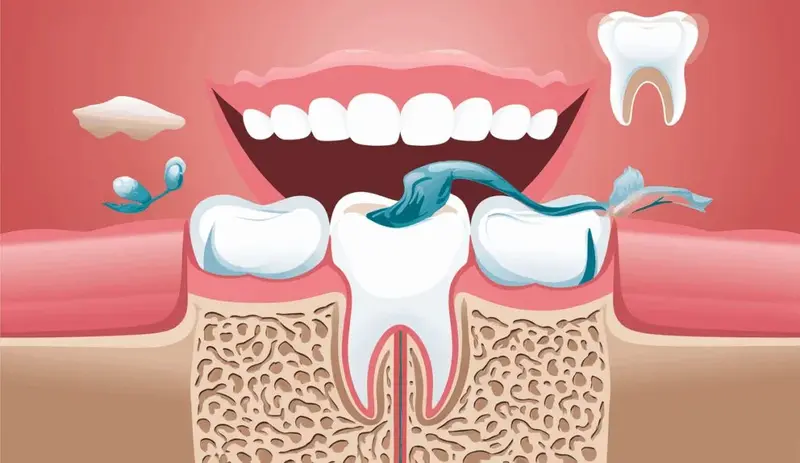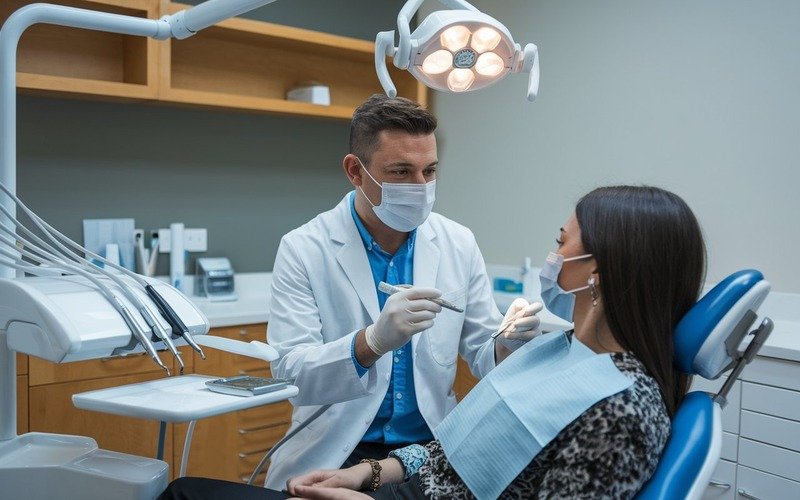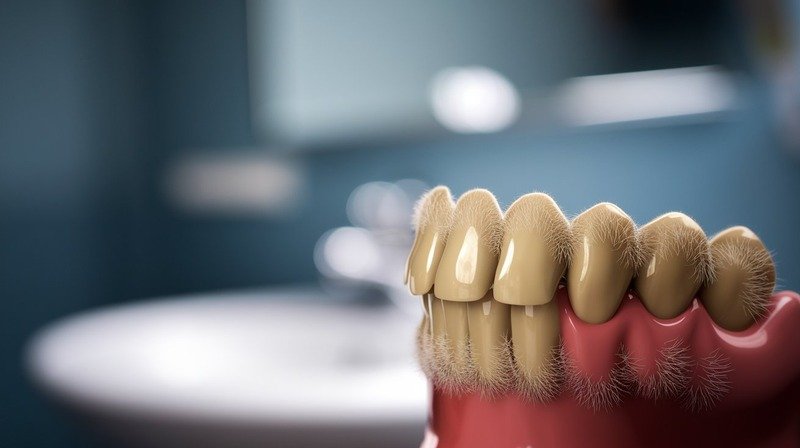Sleep apnea is a common yet serious sleep disorder that affects millions of people worldwide. It is characterized by repeated interruptions in breathing during sleep, which can lead to poor sleep quality and a range of health issues. While sleep apnea is often associated with snoring, its impact extends far beyond just making noise at night. Left untreated, sleep apnea can lead to significant health problems, including cardiovascular disease, diabetes, and even increased mortality risk. At our dental clinic in Houston TX, we are committed to helping patients understand the causes, symptoms, and treatments of sleep apnea to improve both their sleep and overall health.
What is Sleep Apnea?
Sleep apnea occurs when a person’s breathing is repeatedly interrupted during sleep. These interruptions, known as apneas, can last for a few seconds to a minute and may occur hundreds of times throughout the night. Each time an apnea occurs, the brain briefly wakes the person up to resume normal breathing, disrupting the sleep cycle and preventing deep, restorative sleep.
There are three main types of sleep apnea:
1. Obstructive Sleep Apnea (OSA)
Obstructive Sleep Apnea (OSA) is the most common form of sleep apnea. It occurs when the muscles in the throat relax excessively during sleep, causing a partial or complete blockage of the airway. This obstruction leads to pauses in breathing and can cause the individual to gasp, choke, or snore loudly as they struggle to breathe.
2. Central Sleep Apnea (CSA)
Central Sleep Apnea (CSA) is less common and occurs when the brain fails to send the proper signals to the muscles that control breathing. Unlike OSA, CSA is not caused by a physical blockage of the airway but rather a dysfunction in the brain’s respiratory control center.
3. Complex Sleep Apnea Syndrome
Also known as treatment-emergent central sleep apnea, this type of sleep apnea is a combination of OSA and CSA. It occurs when someone with OSA develops central sleep apnea after starting treatment for their obstructive sleep apnea, often with Continuous Positive Airway Pressure (CPAP) therapy.
Causes of Sleep Apnea
The causes of sleep apnea vary depending on the type, but several risk factors are common across all forms of the condition. Understanding these causes can help identify those at risk and guide the choice of treatment.
1. Obstructive Sleep Apnea Causes
- Excess Weight: Being overweight or obese is a significant risk factor for OSA. Excess fat deposits around the neck can compress the airway, making it more likely to collapse during sleep.
- Anatomical Factors: Certain anatomical features, such as a thick neck, a narrow airway, enlarged tonsils or adenoids, or a large tongue, can contribute to the development of OSA.
- Aging: As people age, the muscles in the throat naturally weaken, increasing the likelihood of airway obstruction during sleep.
- Gender: Men are more likely than women to develop OSA, although the risk for women increases after menopause.
- Family History: A family history of sleep apnea increases the likelihood of developing the condition.
- Alcohol and Sedatives: These substances relax the muscles in the throat, making airway obstruction more likely during sleep.
- Smoking: Smoking can increase inflammation and fluid retention in the upper airway, worsening OSA.
2. Central Sleep Apnea Causes
- Heart Disorders: Conditions such as congestive heart failure and atrial fibrillation can contribute to the development of CSA.
- Stroke: Stroke or other neurological conditions that affect the brainstem can lead to CSA.
- High Altitude: Sleeping at high altitudes can sometimes trigger CSA due to lower oxygen levels.
- Opioid Use: Opioid medications can depress the brain’s respiratory centers, increasing the risk of CSA.
3. Complex Sleep Apnea Causes
Complex sleep apnea syndrome occurs when a patient with OSA develops CSA after beginning treatment, typically with CPAP therapy. The exact cause of this phenomenon is not fully understood, but it is believed to be related to the brain’s adaptation to continuous positive airway pressure.
Symptoms of Sleep Apnea
Sleep apnea often goes undiagnosed because many of its symptoms occur during sleep. However, several signs and symptoms can indicate the presence of the condition. If you or a loved one experience any of the following symptoms, it is essential to seek evaluation and treatment at our dental office in Houston TX.
Common Symptoms of Obstructive Sleep Apnea (OSA)
- Loud Snoring: Loud and chronic snoring is one of the most common signs of OSA. However, not everyone who snores has sleep apnea.
- Gasping or Choking During Sleep: Episodes of gasping, choking, or snorting during sleep may indicate that the airway is being obstructed.
- Frequent Awakening: Individuals with OSA may wake up frequently throughout the night, often without realizing it, leading to poor sleep quality.
- Morning Headaches: Waking up with a headache is a common symptom of OSA, likely due to low oxygen levels during the night.
- Daytime Fatigue: Excessive daytime sleepiness, difficulty concentrating, and irritability can result from the poor quality of sleep caused by OSA.
- Dry Mouth or Sore Throat: Waking up with a dry mouth or sore throat is common in those with OSA, as they often breathe through their mouth during sleep.
- Insomnia: Difficulty falling or staying asleep may occur in those with OSA, as the repeated awakenings disrupt the sleep cycle.
Common Symptoms of Central Sleep Apnea (CSA)
- Episodes of Breathing Cessation: Unlike OSA, CSA does not typically cause snoring, but individuals may experience pauses in breathing during sleep.
- Frequent Awakening: Like OSA, CSA can cause frequent awakenings throughout the night, leading to poor sleep quality.
- Difficulty Staying Asleep: CSA can cause insomnia, with individuals frequently waking up throughout the night.
- Daytime Fatigue: Excessive daytime sleepiness, difficulty concentrating, and irritability are common in those with CSA.
- Shortness of Breath Upon Awakening: Individuals with CSA may wake up feeling short of breath or as though they are suffocating.
At our dental clinic in Houston TX, we encourage patients to discuss any symptoms they may be experiencing with our team, as early diagnosis and treatment are crucial for preventing the complications associated with sleep apnea.
Health Risks Associated with Sleep Apnea
Sleep apnea is more than just a sleep disorder; it is a serious condition that can have significant health consequences if left untreated. Understanding the potential risks associated with sleep apnea highlights the importance of seeking treatment at our dental office in Houston TX.
1. Cardiovascular Disease
Sleep apnea has been strongly linked to cardiovascular disease, including hypertension (high blood pressure), heart disease, and stroke. The repeated interruptions in breathing during sleep can lead to a drop in blood oxygen levels, which in turn causes the heart to work harder. Over time, this increased strain on the heart can lead to serious complications.
- Hypertension: The repeated drops in oxygen levels caused by sleep apnea can trigger the body’s stress response, leading to an increase in blood pressure. This chronic elevation in blood pressure increases the risk of heart disease and stroke.
- Heart Disease: Sleep apnea has been linked to an increased risk of heart attacks, arrhythmias (irregular heartbeats), and heart failure. The condition can exacerbate existing heart conditions and contribute to the development of new ones.
- Stroke: The risk of stroke is significantly higher in individuals with untreated sleep apnea. The repeated interruptions in oxygen supply to the brain can damage blood vessels and increase the likelihood of a stroke.
2. Diabetes
Sleep apnea is also associated with an increased risk of type 2 diabetes. The condition can cause insulin resistance, a condition in which the body’s cells become less responsive to insulin, leading to elevated blood sugar levels. Poor sleep quality caused by sleep apnea can also disrupt the body’s ability to regulate glucose, further increasing the risk of diabetes.
3. Metabolic Syndrome
Metabolic syndrome is a cluster of conditions that increase the risk of heart disease, stroke, and diabetes. These conditions include high blood pressure, high blood sugar, excess body fat around the waist, and abnormal cholesterol levels. Sleep apnea has been linked to an increased risk of developing metabolic syndrome, making it a critical condition to address.
4. Weight Gain and Obesity
Sleep apnea and obesity are closely related, with each condition potentially exacerbating the other. Obesity is a significant risk factor for sleep apnea, as excess fat deposits around the neck can compress the airway. Conversely, sleep apnea can lead to weight gain by disrupting the body’s metabolism and increasing appetite, particularly for high-calorie foods.
5. Cognitive Impairment
The poor sleep quality caused by sleep apnea can lead to cognitive impairment, including difficulty concentrating, memory problems, and reduced mental alertness. Over time, untreated sleep apnea can contribute to the development of cognitive disorders, such as dementia and Alzheimer’s disease.
6. Mood Disorders
Sleep apnea is associated with an increased risk of mood disorders, including depression and anxiety. The chronic sleep deprivation caused by the condition can exacerbate these mental health issues, leading to a cycle of worsening symptoms.
7. Increased Mortality Risk
The combination of cardiovascular disease, diabetes, and other health issues associated with sleep apnea contributes to an increased risk of premature death. Individuals with untreated sleep apnea are at a higher risk of mortality from cardiovascular causes, highlighting the importance of seeking treatment at our dental clinic in Houston TX.
Diagnosing Sleep Apnea
Diagnosing sleep apnea typically involves a combination of clinical evaluation, medical history, and sleep studies. At our dental office in Houston TX, we work closely with sleep specialists to ensure an accurate diagnosis and appropriate treatment plan.
1. Clinical Evaluation
During a clinical evaluation, our dentist in Houston TX will ask about your symptoms, sleep habits, and any underlying health conditions that may contribute to sleep apnea. We may also perform a physical examination to check for signs of anatomical factors that could be contributing to the condition, such as a thick neck, enlarged tonsils, or a narrow airway.
2. Medical History
Your medical history is an important component of the diagnostic process. We will ask about any family history of sleep apnea, as well as any other medical conditions you may have, such as hypertension, diabetes, or heart disease.
3. Sleep Studies
A sleep study, also known as a polysomnogram, is the most definitive way to diagnose sleep apnea. This test is typically conducted in a sleep lab, where your breathing, heart rate, oxygen levels, brain activity, and other physiological functions are monitored overnight. Home sleep apnea tests are also available and may be recommended for certain patients.
Types of Sleep Studies:
- Polysomnography: Conducted in a sleep lab, this comprehensive test monitors a wide range of physiological functions during sleep.
- Home Sleep Apnea Test (HSAT): A simplified version of polysomnography that can be conducted at home. This test typically monitors breathing, oxygen levels, and heart rate.
The results of the sleep study will help determine the severity of your sleep apnea and guide the choice of treatment.
Treatment Options for Sleep Apnea
The treatment of sleep apnea depends on the severity of the condition, its underlying causes, and the patient’s overall health. At our dental clinic in Houston TX, we offer a range of treatment options to help manage sleep apnea and improve your quality of life.
1. Lifestyle Changes
For mild cases of sleep apnea, lifestyle changes may be sufficient to reduce symptoms and improve sleep quality. These changes may include:
- Weight Loss: Losing weight can reduce the amount of fat around the neck, decreasing the likelihood of airway obstruction during sleep.
- Sleeping Position: Sleeping on your side rather than your back can prevent the tongue and soft palate from collapsing into the airway.
- Avoiding Alcohol and Sedatives: These substances relax the muscles in the throat, making airway obstruction more likely. Avoiding them before bedtime can help reduce snoring and apnea episodes.
- Quitting Smoking: Smoking can increase inflammation and fluid retention in the upper airway, worsening sleep apnea. Quitting smoking can improve symptoms and overall health.
2. Continuous Positive Airway Pressure (CPAP)
Continuous Positive Airway Pressure (CPAP) therapy is the most common and effective treatment for moderate to severe obstructive sleep apnea. CPAP therapy involves wearing a mask over the nose and/or mouth during sleep. The mask is connected to a machine that delivers a continuous stream of air, keeping the airway open and preventing apneas.
Benefits of CPAP Therapy:
- Effective: CPAP is highly effective in reducing or eliminating apnea episodes, improving sleep quality, and reducing the risk of associated health complications.
- Customizable: CPAP machines are adjustable, allowing the air pressure to be tailored to the patient’s needs.
At our dental office in Houston TX, we work closely with sleep specialists to ensure that our patients receive the appropriate CPAP therapy and support.
3. Oral Appliance Therapy
Oral appliance therapy involves the use of a custom-made oral device that is worn during sleep to keep the airway open. These devices, often referred to as mandibular advancement devices (MADs), work by gently repositioning the lower jaw forward, preventing the collapse of the airway.
Benefits of Oral Appliance Therapy:
- Non-Invasive: Oral appliances are a non-invasive alternative to CPAP therapy, making them an attractive option for patients who cannot tolerate CPAP.
- Comfortable: Custom-fitted oral appliances are comfortable to wear and easy to travel with.
- Effective: Oral appliance therapy is effective in reducing or eliminating symptoms of mild to moderate obstructive sleep apnea.
At our dental clinic in Houston TX, we offer custom oral appliances for patients with sleep apnea. These devices are tailored to your unique anatomy, ensuring optimal comfort and effectiveness.
4. Surgery
In some cases, surgery may be recommended to treat sleep apnea, particularly if other treatments have not been effective. Surgical options vary depending on the underlying cause of the condition and may include:
- Uvulopalatopharyngoplasty (UPPP): A procedure that removes excess tissue from the throat, including the uvula, to widen the airway.
- Genioglossus Advancement (GA): A procedure that repositions the attachment of the tongue to prevent it from collapsing into the airway.
- Maxillomandibular Advancement (MMA): A more complex procedure that involves repositioning the upper and lower jaw to enlarge the airway.
- Nasal Surgery: Procedures to correct nasal obstructions, such as a deviated septum, that contribute to sleep apnea.
Surgery is typically considered a last resort after other treatments have been explored. Our dental office in Houston TX will work with you and your healthcare team to determine if surgery is necessary and which procedure is most appropriate for your condition.
Conclusion: Managing Sleep Apnea with the Help of Our Dental Clinic in Houston TX
Sleep apnea is a serious condition that requires prompt diagnosis and treatment to prevent the associated health risks. At our dental clinic in Houston TX, we are dedicated to helping our patients manage their sleep apnea and improve their quality of life through personalized care and a range of treatment options.
If you suspect that you have sleep apnea or are experiencing symptoms such as loud snoring, daytime fatigue, or frequent awakenings, we encourage you to schedule a consultation with our dentist in Houston TX today. Our experienced team is here to provide you with the care and support you need to achieve better sleep and better health.
Contact our dental clinic in Houston TX to learn more about how we can help you manage your sleep apnea and protect your overall well-being. We look forward to being a part of your journey to better sleep and a healthier future.






